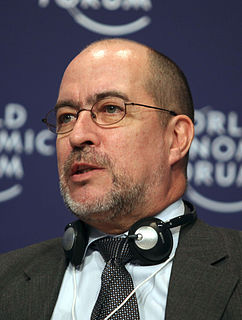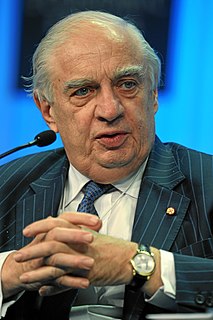The Marrakesh Agreement, manifested by the Marrakesh Declaration, was an agreement signed in Marrakesh, Morocco, by 124 nations on 15 April 1994, marking the culmination of the 8-year-long Uruguay Round and establishing the World Trade Organization, which officially came into being on 1 January 1995.

The World Trade Organization (WTO) is an intergovernmental organization that is concerned with the regulation of international trade between nations. The WTO officially commenced on 1 January 1995 under the Marrakesh Agreement, signed by 124 nations on 15 April 1994, replacing the General Agreement on Tariffs and Trade (GATT), which commenced in 1948. It is the largest international economic organization in the world.
In international economic relations and international politics, "most favoured nation" (MFN) is a status or level of treatment accorded by one state to another in international trade. The term means the country which is the recipient of this treatment must nominally receive equal trade advantages as the "most favoured nation" by the country granting such treatment. In effect, a country that has been accorded MFN status may not be treated less advantageously than any other country with MFN status by the promising country. There is a debate in legal circles whether MFN clauses in bilateral investment treaties include only substantive rules or also procedural protections.
The Uruguay Round was the 8th round of multilateral trade negotiations (MTN) conducted within the framework of the General Agreement on Tariffs and Trade (GATT), spanning from 1986 to 1993 and embracing 123 countries as "contracting parties". The Round led to the creation of the World Trade Organization, with GATT remaining as an integral part of the WTO agreements. The broad mandate of the Round had been to extend GATT trade rules to areas previously exempted as too difficult to liberalize and increasingly important new areas previously not included. The Round came into effect in 1995 with deadlines ending in 2000 under the administrative direction of the newly created World Trade Organization (WTO).

The Director-General of the World Trade Organization is responsible for supervising the administrative functions of the World Trade Organization (WTO). Because World Trade Organizations' decisions are made by member states, the Director-General has little power over matters of policy - the role is primarily advisory and managerial. The Director-General supervises the WTO secretariat of about 700 staff and is appointed by WTO members for a term of four years.

Non-tariff barriers to trade (NTBs) or sometimes called "Non-Tariff Measures (NTMs)" are trade barriers that restrict imports or exports of goods or services through mechanisms other than the simple imposition of tariffs.

International trade law includes the appropriate rules and customs for handling trade between countries. However, it is also used in legal writings as trade between private sectors, which is not right. This branch of law is now an independent field of study as most governments have become part of the world trade, as members of the World Trade Organization (WTO). Since the transaction between private sectors of different countries is an important part of the WTO activities, this latter branch of law is now a very important part of the academic works and is under study in many universities across the world.
The Kennedy Round was the sixth session of General Agreement on Tariffs and Trade (GATT) multilateral trade negotiations held between 1964 and 1967 in Geneva, Switzerland. Congressional passage of the U.S. Trade Expansion Act in 1962 authorized the White House to conduct mutual tariff negotiations, ultimately leading to the Kennedy Round. Participation greatly increased over previous rounds. Sixty-six nations, representing 80% of world trade, attended the official opening on May 4, 1964, at the Palais des Nations. Despite several disagreements over details, the director general announced the round’s success on May 15, 1967, and the final agreement was signed on June 30, 1967—the very last day permitted under the Trade Expansion Act. The round was named after U.S. President John F. Kennedy, who was assassinated six months before the opening negotiations.
Olivier Long was a Swiss Ambassador and the director-general of the General Agreement on Tariffs and Trade from May 6, 1968 to October 1, 1980.

Alejandro Jara was a Deputy Director-General of the World Trade Organization (WTO). He served in this position from 2005 to 2013. His career began in 1976 when he joined the Foreign Service of Chile to primarily focus on international economic relations. From 1979 to 1984, he served in the Delegation of Chile to the General Agreement on Tariffs and Trade (GATT) and was seconded to the Economic System for Latin America (SELA) in Caracas as Coordinator for Trade Policy Affairs. He was appointed Director for Bilateral Economic Affairs in 1993 and Director for Multilateral Economic Affairs in 1994. From 1996 to 1997, he was also Chile's senior official to the Asia-Pacific Economic Cooperation (APEC) and Deputy Chief Negotiator for the Chile-Canada Free Trade Agreement and Chile-Mexico Free Trade Agreement. In 1999, he was designated Director General for International Economic Relations. He was appointed in 2000 as Ambassador, Permanent Representative of Chile to the World Trade Organization in Geneva. From 2000 to 2005 he held various diplomatic and ministerial positions, including Chairperson of the Committee on Trade and Environment of the WTO in 2001 and Chairman of the Special Session of the Council for Trade in Services in 2002. He's written a variety of papers on international trade.
The International Trade Organization (ITO) was the proposed name for an international institution for the regulation of trade.
The original member states of theWorld Trade Organization are the parties to the GATT after ratifying the Uruguay Round Agreements, and the European Communities. They obtained this status at the entry into force on 1 January 1995 or upon their date of ratification. All other members have joined the organization as a result of negotiation, and membership consists of a balance of rights and obligations. The process of becoming a World Trade Organization (WTO) member is unique to each applicant country, and the terms of accession are dependent upon the country's stage of economic development and the current trade regime.
This is a timeline of the World Trade Organization (WTO).
Rufus Hawkins Yerxa is an American lawyer and former U.S. government and international official. He is currently President of the National Foreign Trade Council. He served as Deputy United States Trade Representative during the George H.W. Bush and Clinton Administrations, and served for 11 years as Deputy Director General of the World Trade Organization (WTO).
The term multilateral trade negotiations (MTN) initially applied to negotiations between General Agreement on Tariffs and Trade (GATT) member nations conducted under the auspices of the GATT and aimed at reducing tariff and nontariff trade barriers. In 1995 the World Trade Organization (WTO) replaced the GATT as the administrative body. A current round of multilateral trade negotiations was conducted in the Doha Development Agenda round.
Customs valuation is the process where customs authorities assign a monetary value to a good or service for the purposes of import or export. Generally, authorities engage in this process as a means of protecting tariff concessions, collecting revenue for the governing authority, implementing trade policy, and protecting public health and safety. Customs duties, and the need for customs valuation, have existed for thousands of years among different cultures, with evidence of their use in the Roman Empire, the Han Dynasty and the Indian sub-continent. The first recorded customs tariff was from 136 in Palmyra, an oasis city in the Syrian desert. Beginning near the end of the 20th century, the procedures used throughout most of the world for customs valuation were codified in the Agreement on Implementation of Article VII of the General Agreement on Tariffs and Trade (GATT) 1994.

The Ambassador and Permanent Representative of Australia to the World Trade Organization is an officer of the Australian Department of Foreign Affairs and Trade and the head of the Permanent Mission of the Commonwealth of Australia to the World Trade Organization (WTO) in Geneva, Switzerland. The position has the rank and status of an Ambassador Extraordinary and Plenipotentiary and continues Australia's representation to the General Agreement on Tariffs and Trade, as a charter member joining the WTO to replace the GATT on 1 January 1995. The Permanent Mission to the WTO is based with the Australian Permanent Mission and Consulate-General in Geneva. Prior to 1983, the role of Australia's representative on the GATT was filled by the Permanent Representative of Australia to the United Nations Office in Geneva.

The World Trade Organization (WTO) is an intergovernmental organization which regulates international trade. The WTO officially commenced on 1 January 1995 under the Marrakesh Agreement, signed by 123 nations on 15 April 1994, replacing the General Agreement on Tariffs and Trade (GATT), which commenced in 1948. The WTO deals with regulation of trade between participating countries by providing a framework for negotiating trade agreements and a dispute resolution process aimed at enforcing participants' adherence to WTO agreements, which is signed by representatives of member governments and ratified by their parliaments. Most of the issues that the WTO focuses on derive from previous trade negotiations, especially from the Uruguay Round (1986–1994).






